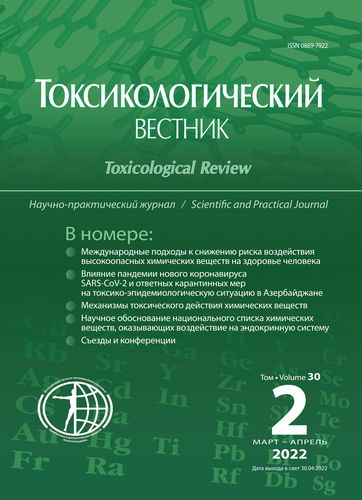EFFECT OF SUBCHRONIC USE OF SODIUM NITRITE ON THE FUNCTIONAL PARAMETERS OF AN ISOLATED RAT HEART
- Authors: Laptev D.S.1, Petunov S.G.1, Nechaykina O.V.1, Bobkov D.V.1
-
Affiliations:
- Research Institute of Hygiene, Occupational Pathology and Human Ecology of the Federal medical and biological Agency
- Issue: No 2 (2022)
- Section: Main unit
- Published: 21.04.2023
- URL: https://rjsocmed.com/0869-7922/article/view/641451
- DOI: https://doi.org/10.15690/vramn358
- ID: 641451
Cite item
Full Text
Abstract
On a model of an isolated rat heart, the cardio toxic effect of sodium nitrite was revealed after subchronic intragastric administration for 28 days at doses of 0.03; 0.3; 3.0 mg/kg. The use of sodium nitrite leads to dilatation of the coronary vessels and myocardium, impairment of its electrical activity in the shortening of the QT interval, associated with an increased risk of ventricular fibrillation, and a tendency to an increase in the amplitude of the T wave, which indicates myocardial ischemia. In a load with a total ischemic test, it was found that the magnitude of the change in indicators characterizing the restoration of myocardial function under conditions of reperfusion is inversely proportional to the dose of sodium nitrite used. Thus, it was found that sodium nitrite has cardiotoxicity at a dose of 0.028 mg/kg, which is two times lower than the permissible daily intake for humans established by the WHO (0.06 mg/kg).
About the authors
Denis Sergeevich Laptev
Research Institute of Hygiene, Occupational Pathology and Human Ecology of the Federal medical and biological Agency
Email: lapden@mail.ru
ORCID iD: 0000-0002-3960-3058
Candidate of Biological Sciences, Head of the Laboratory of Extreme Physiology, SPIN: 2873-5071, AuthorID: 527873 Russian Federation
Sergei Gervasievich Petunov
Research Institute of Hygiene, Occupational Pathology and Human Ecology of the Federal medical and biological Agency
Email: sergey-petunov@mail.ru
ORCID iD: 0000-0001-6781-8315
Candidate of Medical Sciences, Head of the Scientific and Organizational Department, SPIN: 1016-5878, AuthorID: 199594 Russian Federation
Olga Valer'evna Nechaykina
Research Institute of Hygiene, Occupational Pathology and Human Ecology of the Federal medical and biological Agency
Author for correspondence.
Email: olga2278@mail.ru
ORCID iD: 0000-0001-7151-7240
Senior Researcher of the Laboratory of Extreme Physiology, SPIN: 8194-8790, AuthorID: 921901 Russian Federation
Dmitry Vladimirovich Bobkov
Research Institute of Hygiene, Occupational Pathology and Human Ecology of the Federal medical and biological Agency
Email: bdv21@yandex.ru
ORCID iD: 0000-0002-1823-4361
Senior Researcher of the Laboratory of Extreme Physiology, SPIN: 2673-8240, AuthorID: 985255 Russian Federation
References
- Zhloba A.A., Subbotina T.F., Alekseevskaia E.S. The content of nitrogen oxides in the blood plasma of healthy individuals, depending on age. Clinical laboratory diagnostics. 2016; 61 (11): 760–765 (in Russian).
- Dejam A., Hunter C.J., Pelletier M.M., Hsu L.L., Machado R.F. Erythrocytes are the major intravascular storage sites of nitrite in human blood. Blood. 2005; 106: 734-739.
- Evaluation of certain food additives and contaminants. World Health Organization, Joint FAO/WHO Expert Committee on Food Additives, WHO Technical Report Series No. 859; 1995. 29–35.
- Reutov V.P., Sorokina E.G. The nitric oxide cycle is a new metabolic cycle involved in the regulation of intracellular signaling. Molecular biology. 1998; 2 (32): 377–378 (in Russian).
- Plekhova N.G., Somova L.M. Physiological role of nitric oxide in the infectious process. Advances in physiological Sciences. 2012;3(43): 62–81 (in Russian).
- Nitrate in vegetables: scientific opinion of the panel on contaminants in the food chain. The EFSA Journal. 2008; 689: 1–79.
- Laptev D.S., Petunov S.G., Nechaykina O.V., Bobkov D.V. Сardiotropic effect of sublethal and lethal concentrations of sodium nitrite on the functional activity of an isolated heart. MEDLINE.RU, Experimental toxicology. 2020; 21(in Russian).
- Laptev D.S., Petunov S.G., Bobkov D.V., Radilov A.S. The influence of β-endorphin on the functional activity of the isolated heart of rat. The role δ-opioid receptors. Regionarnoe krovoobrashhenie i mikrocirkuljacija. 2015; 3(55): 66–71 (in Russian).
- Petenkova A.A., Kovalenko R.I., Rubets E.D., Mashkina E.A., Nozdrachev A.D. Hypoxic preconditioning and functioning of an isolated heart. Proceedings of the XXIII Congress of the physiological society I.Р. Pavlova with international participation: Izdatel'stvo Istoki (Moscow). 2017; 2335–2337 (in Russian).
Supplementary files








